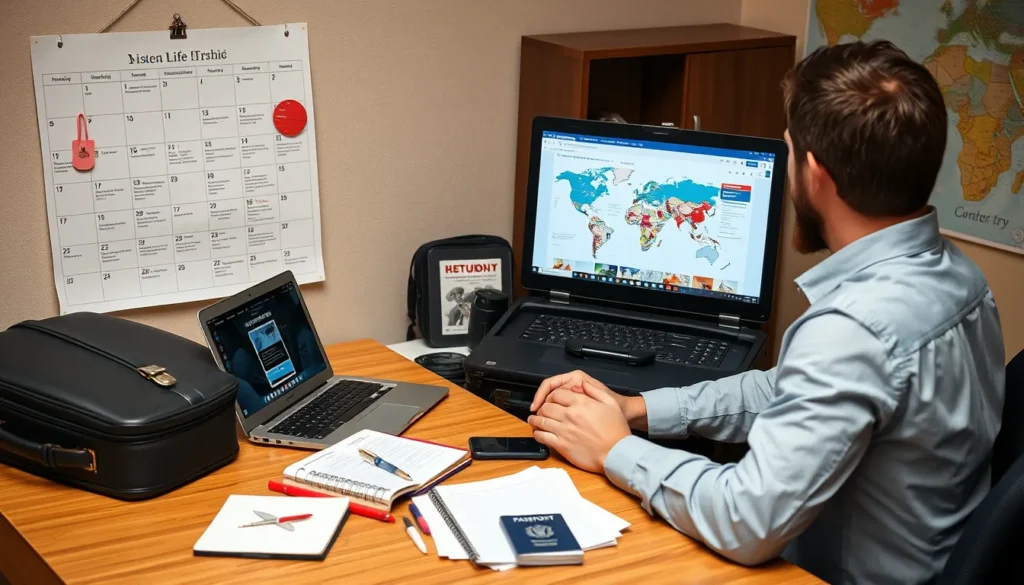Table of Contents
Traveling abroad can be an exhilarating experience, offering opportunities to explore new cultures, meet diverse people, and broaden horizons
However, it also comes with inherent risks, especially for individuals working in sensitive roles or representing organizations with security concerns. A defensive foreign travel briefing plays a pivotal role in preparing travelers for potential threats and ensuring their safety. But when exactly must you receive one? Let’s delve into the key scenarios and requirements.
Understanding Defensive Foreign Travel Briefings

A defensive foreign travel briefing is a specialized session designed to educate travelers about the potential risks they may encounter in foreign countries. These briefings cover a wide range of topics, including:
- Cybersecurity Threats: How to secure devices, avoid phishing scams, and protect sensitive data.
- Physical Security Measures: Tips for staying safe in public spaces, recognizing surveillance, and handling emergencies.
- Cultural Awareness: Understanding local customs, laws, and etiquette to avoid unintentional offenses.
- Emergency Protocols: Steps to take in case of natural disasters, civil unrest, or medical emergencies.
These briefings are often mandatory for individuals traveling to high-risk areas or those with access to sensitive information.
Key Scenarios Requiring a Defensive Foreign Travel Briefing
There are specific situations where receiving a defensive foreign travel briefing is not just recommended but mandatory. Below are the most common scenarios:
1. Government Employees and Contractors
If you work for a government agency or are a contractor handling classified information, attending a defensive foreign travel briefing before traveling abroad is typically required. This ensures you are aware of espionage risks and know how to safeguard sensitive data 2.
2. Corporate Travelers with Access to Proprietary Information
Employees of companies dealing with intellectual property, trade secrets, or other proprietary information often need to undergo these briefings. Industries such as technology, defense, and pharmaceuticals are particularly vulnerable to industrial espionage, making these briefings essential.
3. Travel to High-Risk Countries
If your destination is classified as high-risk due to political instability, terrorism, or high crime rates, a defensive briefing becomes crucial. Organizations like the U.S. Department of State provide travel advisories that can help determine if your destination falls into this category 3.
4. First-Time Travelers to Certain Regions
For first-time travelers to regions with significantly different cultural or political environments, a briefing can help navigate potential challenges and avoid misunderstandings. It equips travelers with the knowledge needed to adapt quickly and stay safe.
What Does a Defensive Foreign Travel Briefing Cover?

Defensive foreign travel briefings are comprehensive and tailored to the traveler’s specific needs. Here’s what you can expect to learn:
- Cybersecurity Best Practices: Techniques for securing personal and professional devices, avoiding online threats, and protecting sensitive information.
- Physical Security Measures: Strategies for staying safe in unfamiliar environments, recognizing signs of danger, and responding effectively during emergencies.
- Cultural Awareness: Insights into local customs, traditions, and legal systems to foster respectful interactions and prevent unintentional offenses.
- Emergency Protocols: Clear guidelines on what to do in case of unforeseen events, such as natural disasters, civil unrest, or health crises.
Who Provides Defensive Foreign Travel Briefings?
These briefings are typically provided by:
- Government Agencies: For example, the Defense Security Service (DSS) offers briefings for U.S. government personnel.
- Private Security Firms: Specialized firms partner with corporations to deliver customized training programs.
- Corporate Security Departments: Many organizations have internal teams dedicated to traveler safety and risk management.
How Often Should You Receive a Briefing?
The frequency of defensive foreign travel briefings depends on your role, travel patterns, and organizational policies. Below is a general guideline:
| Scenario | Frequency |
|---|---|
| Government Employees | Before each trip to high-risk areas; annually or as needed5. |
| Corporate Travelers | Annually or as needed based on travel destinations and job responsibilities. |
| First-Time Travelers | Before the trip. |
| Long-Term Travelers (>90 Days) | Upon return from extended trips, a debriefing may also be required1. |
For frequent travelers, annual refreshers are standard practice. However, if you’re visiting a new high-risk area or your job responsibilities change, additional sessions may be necessary.
Essential Components of a Defensive Foreign Travel Briefing
To ensure effectiveness, a well-rounded briefing should include:
- Risk Assessment: An evaluation of the specific risks associated with the destination.
- Threat Mitigation Strategies: Practical steps to minimize exposure to potential dangers.
- Local Laws and Customs: Guidance on adhering to local regulations and respecting cultural norms.
- Contact Information: Details of emergency contacts, including embassy numbers and local authorities.
How to Prepare for a Defensive Foreign Travel Briefing
Before attending a briefing, consider the following tips:
- Research your destination thoroughly using resources like the U.S. Department of State website.
- Compile a list of questions or concerns related to your trip.
- Review any previous briefings or materials provided by your organization.
- Be open-minded and willing to learn, as the information shared could be life-saving.
The Role of Defensive Travel Briefings in Ensuring Personal Safety Abroad
Defensive travel briefings serve as a vital tool for enhancing personal safety and security while traveling internationally. They empower travelers with the knowledge and skills needed to identify and respond to potential threats. By staying informed and prepared, individuals can mitigate risks and enjoy a safer, more rewarding travel experience.
Common Misconceptions About Defensive Foreign Travel Briefings
Here are some common misconceptions about these briefings and why they are incorrect:
- “I don’t need a briefing because I’ve traveled before.” Even experienced travelers benefit from updated information, especially if traveling to unfamiliar or high-risk areas.
- “Briefings only apply to government employees.” Corporate travelers and individuals visiting certain regions also require briefings to address unique risks.
- “They’re just formalities and not practical.” Briefings provide actionable advice that can prevent serious issues, such as data breaches or physical harm.
Conclusion
By understanding when and why you need a defensive foreign travel briefing, you can better prepare for your travels and significantly reduce potential risks. Whether you’re a government employee, corporate traveler, or leisure visitor to a high-risk area, these briefings are an invaluable resource for staying safe and informed.
For more information on travel advisories and security tips, visit the U.S. Department of State website or consult your organization’s security team.

Stay safe, stay informed, and happy travels!

